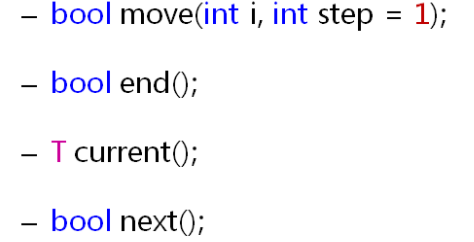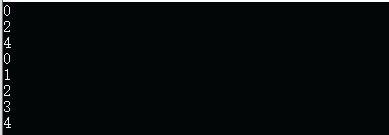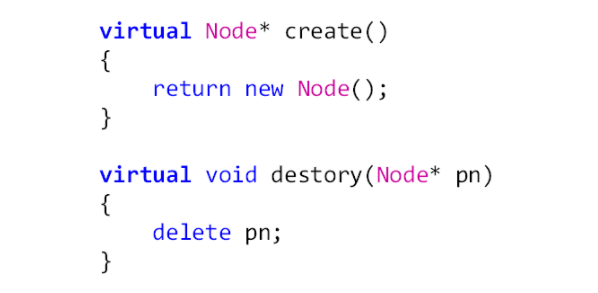1.当前单链表的遍历方法
LinkList<int> l;
for(int i = 0;i < 5;i++)
{
l.insert(0,i);
}
for(int i = 0;i < l.length();i++)
{
l.get(i);
}
在头部插入元素时,时间复杂度是O(n)。 获取元素时,时间复杂度是O(n*n),内层定位位置时有一个O(n)复杂度,那么该怎么优化单链表,使得其在线性的时间内进行遍历操作
2.O(n)操作遍历单链表
解决思路:
在单链表的内部定义一个游标,开始时指向位置为0的数据元素,游标每一次移动获取一下链表的数据元素,这里提供一组遍历函数分别为:

其中各个函数的定义为:
move函数的i参数为目标位置,step参数为每次移动的节点数。
end用来判断当前的游标是否到达了单链表的尾部。
current返回当前游标指向的数据元素。
next移动游标,移动的次数根据move中的step的值来决定。
3.改进后的单链表
LinkList.h
#ifndef __LINK_LIST_
#define __LINK_LIST_
namespace DTlib
{
template<class T>
class LinkList
{
public:
struct Node
{
T value;
Node* next;
};
mutable struct
{
char reverse[sizeof(T)];
Node* next;
} m_header;
int m_length;
int m_step;
Node* m_current;
Node* position(int i)const
{
Node* pre = reinterpret_cast<Node*>(&m_header);
for (int pos = 0; pos < i; pos++)
{
pre = pre->next;
}
return pre;
}
public:
LinkList();
~LinkList();
int find(const T& e)const;
bool end();
bool next();
T current();
bool move(int i, int step = 1);
bool insert(int i, T& e);
bool remove(int i);
bool set(int i, T& e);
T get(int i) const;
int length() const;
void clear();
};
}
#endif
LinkList.cpp
#include "LinkList.h"
#include <iostream>
using namespace DTlib;
using namespace std;
template<class T>
LinkList<T>::LinkList()
{
m_header.next = NULL;
m_length = 0;
m_step = 0;
m_current = NULL;
}
/*template<class T>
Node* LinkList<T>::position(int i)const
{
Node* pre = reinterpret_cast<Node*>(&m_header);
for (int pos = 0; pos < i; pos++)
{
pre = pre->next;
}
return pre;
}*/
template<class T>
int LinkList<T>::find(const T& e)const
{
Node* pre = reinterpret_cast<Node*>(&m_header);
int i = 0;
while (e != pre->next->value)
{
pre = pre->next;
i++;
}
return i;
}
template<class T>
bool LinkList<T>::end()
{
return m_current == NULL;
}
template<class T>
bool LinkList<T>::move(int i, int step)
{
bool ret = (i >= 0) && (i <= m_length);
if (ret)
{
m_current = position(i)->next;
m_step = step;
}
return ret;
}
template<class T>
T LinkList<T>::current()
{
if (!end())
{
return m_current->value;
}
else
{
cout << "current end()" << endl;
return -1;//不知道写啥值
}
}
template<class T>
bool LinkList<T>::next()
{
int i = 0;
while (!end() && i < m_step)
{
m_current = m_current->next;
i++;
}
return i == m_step;
}
template<class T>
bool LinkList<T>::insert(int i, T& e)
{
bool ret = (i >= 0) && (i <= m_length);
if (ret)
{
Node* node = new Node();
if (node != NULL)
{
Node* pre = reinterpret_cast<Node*>(&m_header);
pre = position(i);
node->value = e;
node->next = pre->next;
pre->next = node;
}
else
{
cout << "no memery to malloc" << endl;
}
}
m_length++;
return ret;
}
template<class T>
bool LinkList<T>::remove(int i)
{
bool ret = (i >= 0) && (i <= m_length);
if (ret)
{
Node* pre = reinterpret_cast<Node*>(&m_header);
pre = position(i);
Node* toDel = pre->next;
pre->next = toDel->next;
delete toDel;
m_length--;
}
return ret;
}
template<class T>
bool LinkList<T>::set(int i, T& e)
{
bool ret = (i >= 0) && (i <= m_length);
if (ret)
{
Node* pre = reinterpret_cast<Node*>(&m_header);
pre = position(i);
pre->next->value = e;
}
return ret;
}
template<class T>
T LinkList<T>::get(int i) const
{
bool ret = (i >= 0) && (i <= m_length);
T e;
if (ret)
{
Node* pre = reinterpret_cast<Node*>(&m_header);
pre = position(i);
e = pre->next->value;
}
return e;
}
template<class T>
int LinkList<T>::length() const
{
return m_length;
}
template<class T>
void LinkList<T>::clear()
{
while (m_header.next != NULL)
{
Node* toDel = m_header.next;
m_header.next = toDel->next;
delete toDel;
}
m_length = 0;
}
template<class T>
LinkList<T>::~LinkList()
{
clear();
}
int main()
{
LinkList<int> l;
for (int i = 0; i < 5; i++)
{
l.insert(i, i);
}
for (l.move(0,2); !l.end();l.next())
{
cout << l.current() << endl;
}
for (int i = 0; i < 5; i++)
{
cout << l.find(i) << endl;
}
return 0;
}
结果:

4.单链表内部封装
将所有生成结点的地方的换成create(),销毁结点的地方换成destory();

LinkList.h
#ifndef __LINK_LIST_
#define __LINK_LIST_
namespace DTlib
{
template<class T>
class LinkList
{
public:
struct Node
{
T value;
Node* next;
};
mutable struct
{
char reverse[sizeof(T)];
Node* next;
} m_header;
int m_length;
int m_step;
Node* m_current;
Node* position(int i)const
{
Node* pre = reinterpret_cast<Node*>(&m_header);
for (int pos = 0; pos < i; pos++)
{
pre = pre->next;
}
return pre;
}
Node* create()
{
return new Node();
}
public:
LinkList();
~LinkList();
void destroy(Node* pn);
int find(const T& e)const;
bool end();
bool next();
T current();
bool move(int i, int step = 1);
bool insert(int i, T& e);
bool remove(int i);
bool set(int i, T& e);
T get(int i) const;
int length() const;
void clear();
};
}
#endif
LinkList.cpp
#include "LinkList.h"
#include <iostream>
using namespace DTlib;
using namespace std;
template<class T>
LinkList<T>::LinkList()
{
m_header.next = NULL;
m_length = 0;
m_step = 0;
m_current = NULL;
}
/*template<class T>
Node* LinkList<T>::position(int i)const
{
Node* pre = reinterpret_cast<Node*>(&m_header);
for (int pos = 0; pos < i; pos++)
{
pre = pre->next;
}
return pre;
}*/
template<class T>
void LinkList<T>::destroy(Node* pn)
{
delete pn;
}
template<class T>
int LinkList<T>::find(const T& e)const
{
Node* pre = reinterpret_cast<Node*>(&m_header);
int i = 0;
while (e != pre->next->value)
{
pre = pre->next;
i++;
}
return i;
}
template<class T>
bool LinkList<T>::end()
{
return m_current == NULL;
}
template<class T>
bool LinkList<T>::move(int i, int step)
{
bool ret = (i >= 0) && (i <= m_length);
if (ret)
{
m_current = position(i)->next;
m_step = step;
}
return ret;
}
template<class T>
T LinkList<T>::current()
{
if (!end())
{
return m_current->value;
}
else
{
cout << "current end()" << endl;
return -1;//不知道写啥值
}
}
template<class T>
bool LinkList<T>::next()
{
int i = 0;
while (!end() && i < m_step)
{
m_current = m_current->next;
i++;
}
return i == m_step;
}
template<class T>
bool LinkList<T>::insert(int i, T& e)
{
bool ret = (i >= 0) && (i <= m_length);
if (ret)
{
Node* node = create();
if (node != NULL)
{
Node* pre = reinterpret_cast<Node*>(&m_header);
pre = position(i);
node->value = e;
node->next = pre->next;
pre->next = node;
}
else
{
cout << "no memery to malloc" << endl;
}
}
m_length++;
return ret;
}
template<class T>
bool LinkList<T>::remove(int i)
{
bool ret = (i >= 0) && (i <= m_length);
if (ret)
{
Node* pre = reinterpret_cast<Node*>(&m_header);
pre = position(i);
Node* toDel = pre->next;
pre->next = toDel->next;
delete toDel;
m_length--;
}
return ret;
}
template<class T>
bool LinkList<T>::set(int i, T& e)
{
bool ret = (i >= 0) && (i <= m_length);
if (ret)
{
Node* pre = reinterpret_cast<Node*>(&m_header);
pre = position(i);
pre->next->value = e;
}
return ret;
}
template<class T>
T LinkList<T>::get(int i) const
{
bool ret = (i >= 0) && (i <= m_length);
T e;
if (ret)
{
Node* pre = reinterpret_cast<Node*>(&m_header);
pre = position(i);
e = pre->next->value;
}
return e;
}
template<class T>
int LinkList<T>::length() const
{
return m_length;
}
template<class T>
void LinkList<T>::clear()
{
while (m_header.next != NULL)
{
Node* toDel = m_header.next;
m_header.next = toDel->next;
destroy(toDel);
}
m_length = 0;
}
template<class T>
LinkList<T>::~LinkList()
{
clear();
}
int main()
{
LinkList<int> l;
for (int i = 0; i < 5; i++)
{
l.insert(i, i);
}
for (l.move(0,2); !l.end();l.next())
{
cout << l.current() << endl;
}
for (int i = 0; i < 5; i++)
{
cout << l.find(i) << endl;
}
return 0;
}
结果:
